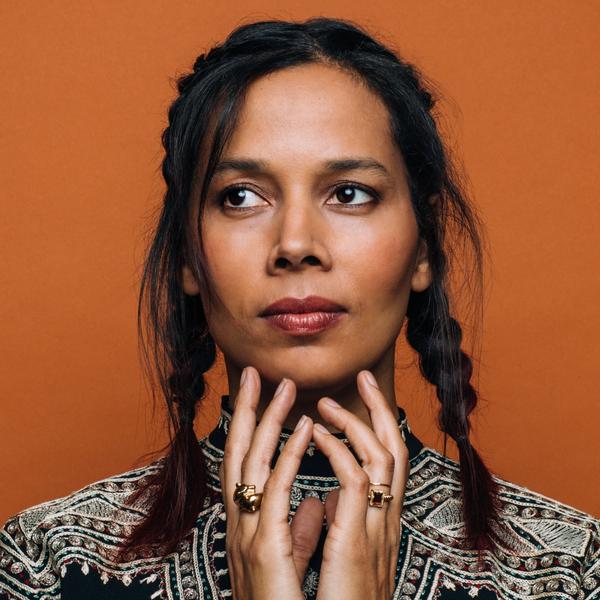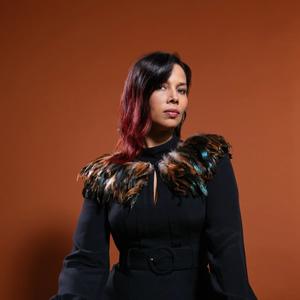




Link copied

When the severity of the global pandemic forced a lockdown order last year, Rhiannon Giddens suddenly found herself cut off from her homeland. Essentially, her choice to stay in Ireland — where she lives when she's not touring — meant that she couldn't visit North Carolina. She experienced homesickness in a way she'd never felt before, uncertain as she was about when she'd be able to visit her native land again.
Giddens searched for a salve in the one place she knew where to find it: music. But it wasn't enough to write her way through her feelings of longing and loss. She needed the community that collaboration offered — the way that it, too, could be a home.
That's when Giddens teamed once again with longtime partner and fellow expat Francesco Turrisi. The two began working on their second album together, They're Calling Me Home, the follow-up to their 2019 Grammy-nominated debut There Is No Other. Once they settled on the songs they'd play, the recording process flew — pairing Giddens' original track 'Avalon' alongside a mix of traditional tunes that touch on death and resiliency. Over six days, in a studio located on a farm outside Dublin, they explored the threads that connect music with country and country with identity.
For Giddens, the traditional fiddle tune ‘Waterbound’ harkens back to North Carolina. Yet, Congolese guitarist Niwel Tsbumbu adds a layer of textual complexity that enriches the song's connection to any one place. On the mournful standard 'Si Dolce E’l Tormento' ('How Sweet the Torment'), Turrisi picks up the cello banjo, heightening Gidden's grief-tinged delivery with further melancholy. Then there's their cover of Alice Gerrard's 'Calling Me Home'. A song about death, Giddens finds a note between despair and hope — a powerful resistance that speaks to the day when she can finally go home.
Speaking with Holler, Giddens discusses why old songs understand us the best, how she can be herself fully with Turrisi, and the way music connects her to places all around the world.

What was it about the songs you chose that spoke to the current moment?
These songs remind us that [a pandemic] is not new — it is for some of us, but not for us all. There are plenty of people in the world who've been dealing with pandemics and their lives falling apart. We've been very spoiled as a certain population for the last couple of generations. I think we're getting hit with this sense of, 'Oh, we're not exempt.' I think these old songs connect us in a way that, for me, is very comforting, like, 'Oh, we're not special, actually.'
It's a necessary reminder.
Yes, and I think it's a good one because we often act as if we are special. We are borrowing against the future to have the kind of life that people have never been able to imagine, like running water, toilets, food and electricity. I don't know how much of a lesson we'll take from all this, but it's reminded me. When I sing something like 'O Death', the feeling of "I don't want to go just yet, it's not my time" is universal. It's a deep well.
In Alice Gerrard's version of 'Calling Me Home', her voice feels resigned, whereas yours captures this steely resolve. How did you approach your interpretation?
It was instinctual. I think that's an approach to death that we don't have enough of, like "I've reached the end of my life, this is now time for me to go, and I know you're going to miss me, but I'm ready." There's not enough space in our society for, "Don't resuscitate me. Don't pump my body full of drugs to keep me going. If my body is ready to stop, then I'm ready to go."
I think it's really beautiful, hopeful and much more connected to the natural cycle of birth, life, and death. Unfortunately, it's been interrupted for people because of COVID and not being around a loved one's death bed. But for me, that song is all about death as it should be: it's not violent; it's peaceful, it's loving. The person is ready to go, and the people around them are prepared to let them go. I think there's a lot to be admired in how she has told that story. I feel very comforted by it.
As you and Francesco traced the music of America, Ireland and Italy, what kind of commonality did you find?
No matter where you go, you have these feelings of homesickness. Being an expat in a place and not being allowed to go home is a very different feeling than knowing you can go home whenever you want. It connects you in a deeper way to the experiences of the immigrant who goes to another place but still has ties back home. Then you have the refugees who don't have a home anymore.
It's a place of immense privilege to be able to jet-set around the globe and go over the ocean in six hours or less whenever you want. So when you take that ability away, you realize the privilege — at least I do a little bit more. It gives you a little tiny window into, "What does that feel like when something stops you from being able to go back home? What does it mean for the new home you're in, and how do you conjure up those aspects of your birth home?" That's a lot of what we've been talking about here.
'Avalon' feels like a beautiful interplay between those three places. What inspired it?
I wrote it some time ago, during the Chocolate Drop time [Gidden's former group; The Carolina Chocolate Drops]. For some reason, we didn't put it on the record, and it's been sitting in my box of unused songs. When we put this record together, I thought about 'Avalon'. I was like, "Well, if now isn't the time to put this puppy out, then when is?"
I rewrote the verses a tiny bit, and it worked out so perfectly. Making that song was beautiful because it was with Francesco and Niwel, who's been living in Ireland for a very long time. Here are three expats from three different continents meeting on this tiny island off the coast of Europe. The three of us came together with our very distinctive viewpoints and cultural flavors to make this song. That struck me; when you look at human history, it's always done this way. People have been moving, been affected and are affecting other people.
“It's not necessarily listening to the music from that time; it's the creation of it that makes me think of being home”
In your opinion, what is it about music that forms this connectivity with the idea of place? You've mentioned how 'Waterbound' brings you back to North Carolina. Can you say a bit more about that thread between song and geography?
Music, in general, forms an emotional tie. There's even more of a need now to connect to it and to have that emotional connection. Music allows us to do that in a way that everyday living doesn't. That's why it's so important. For me, it's not necessarily listening to the music from that time; it's the creation of it that makes me think of being home.
How did you and Francesco flesh out 'Waterbound'?
We don't overlap because of where we come from and what we play, but our approach to music is very similar. What's beautiful is that if I brought this [song] to any American musician, they would hear a particular thing, whereas what he hears isn't the expected. He hears what he hears because he doesn't have a history with the music. When I'm approaching Italian music, I'm coming at it from my perspective; I have no preconceived notions about it.
I think the secret to our particular blend is open-mindedness. It's not an open-mindedness you can fake. We both arrive with blank slates for each other's music. Of course, that's changed a little bit. I'm like, "Here's how I'm going to play this on the banjo. What do you hear?" He's like, "I hear a calabash", it's not even close to what anyone else I play with would've said. I think that's why it works.
Even with Niwel, when you think about 'Waterbound', he's heard American music, but he's just doing his thing. Of course, it's shaped by his life in the Congo and whatever other aspects of music that he's woven into his particular song. I come from the source, and then Francesco, with his breadth of knowledge, builds this sound that he's hearing. I'm not a traditional musician in that I grew up with it, but I'm closer to that song than either one of them. It's all of these approaches coming together and creating this very organic sound.
You mention open-mindedness, and I can't help but think about how you and Francesco recorded both your albums in less than seven days. Is that why things work so quickly with him?
I trained in performance. You record, then you don't take two days layering it and chopping it up. Francesco comes from an improvisational approach, where you respond to the moment. You come up with it right there on the spot, and then maybe we mess with that. If we had done this song on day three instead of day one, it would've been different. There's also an element of danger about it. You give it everything you have because you're like, "If I mess up this take and it was this other person's perfect one, I don't wanna be that guy".
No pressure then?
Right? Much of that pressure is gone in studios now because everybody's on digital and in different rooms. When you know that you can redo it or fix a note, there's no edge. When we did 'Si Dolce', he had just figured out how to play it on the banjo; he'd only ever played it on the piano. It's a 17th-century song that he's played a long time, but with a Renaissance ensemble. He's never done it with a voice and cello banjo, which in and of itself he's not been playing that long. There's this space of openness where you have to get out of the way if you're going to reach it.
“Often, when you decide what you want, the universe provides”
How long did it take for you two to develop that kind of trust? You talk about danger and open-mindedness, yet trust is all there is when you are playing together like that.
Yeah, it's like the events that corporations take their people to?
Team building?
Right! It's like a chicken or an egg thing: to have that trust, you must build it. But then how do you form it? I think we've been playing together for so long that we've come to the point where we want to be who we are. Often, when you decide what you want, the universe provides. I reached a point of, "I'm tired of trying to box myself into this. I want to be who I am." Then this other person appeared who could meet every aspect of who I was. He felt the same way. He said, "finally, now I know why I've been practicing all these weird instruments."
There's a payoff!
Yeah, we felt that instantaneously. Everything we've done since then has been building on that. There's no producer on this record. It's just him and me. I don't think we could've done that at the beginning of our partnership. It came from going in and being in our own creative space.
Rhiannon Giddens and Francesco Turrisi's new album, Calling Me Home, is out this Friday (4/9) via Nonesuch Records.
Photography by Ebru Yildiz.
For more on Rhiannon Giddens, see below:





